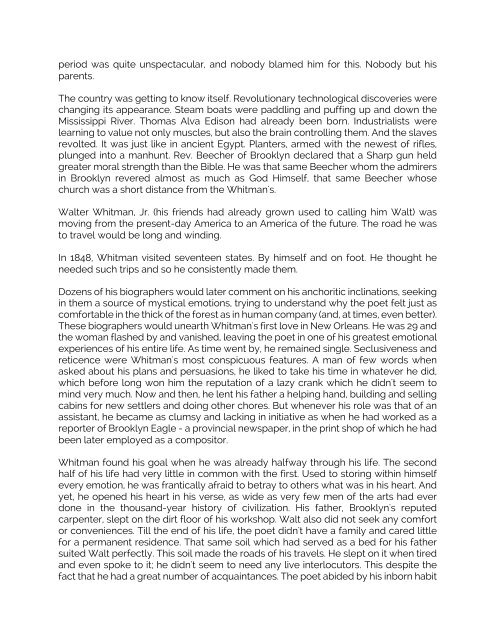PoetsGardenArrowParkNY_dl
You also want an ePaper? Increase the reach of your titles
YUMPU automatically turns print PDFs into web optimized ePapers that Google loves.
period was quite unspectacular, and nobody blamed him for this. Nobody but his<br />
parents.<br />
The country was getting to know itself. Revolutionary technological discoveries were<br />
changing its appearance. Steam boats were pad<strong>dl</strong>ing and puffing up and down the<br />
Mississippi River. Thomas Alva Edison had already been born. Industrialists were<br />
learning to value not only muscles, but also the brain controlling them. And the slaves<br />
revolted. It was just like in ancient Egypt. Planters, armed with the newest of rifles,<br />
plunged into a manhunt. Rev. Beecher of Brooklyn declared that a Sharp gun held<br />
greater moral strength than the Bible. He was that same Beecher whom the admirers<br />
in Brooklyn revered almost as much as God Himself, that same Beecher whose<br />
church was a short distance from the Whitman's.<br />
Walter Whitman, Jr. (his friends had already grown used to calling him Walt) was<br />
moving from the present-day America to an America of the future. The road he was<br />
to travel would be long and winding.<br />
In 1848, Whitman visited seventeen states. By himself and on foot. He thought he<br />
needed such trips and so he consistently made them.<br />
Dozens of his biographers would later comment on his anchoritic inclinations, seeking<br />
in them a source of mystical emotions, trying to understand why the poet felt just as<br />
comfortable in the thick of the forest as in human company (and, at times, even better).<br />
These biographers would unearth Whitman's first love in New Orleans. He was 29 and<br />
the woman flashed by and vanished, leaving the poet in one of his greatest emotional<br />
experiences of his entire life. As time went by, he remained single. Seclusiveness and<br />
reticence were Whitman's most conspicuous features. A man of few words when<br />
asked about his plans and persuasions, he liked to take his time in whatever he did,<br />
which before long won him the reputation of a lazy crank which he didn't seem to<br />
mind very much. Now and then, he lent his father a helping hand, building and selling<br />
cabins for new settlers and doing other chores. But whenever his role was that of an<br />
assistant, he became as clumsy and lacking in initiative as when he had worked as a<br />
reporter of Brooklyn Eagle - a provincial newspaper, in the print shop of which he had<br />
been later employed as a compositor.<br />
Whitman found his goal when he was already halfway through his life. The second<br />
half of his life had very little in common with the first. Used to storing within himself<br />
every emotion, he was frantically afraid to betray to others what was in his heart. And<br />
yet, he opened his heart in his verse, as wide as very few men of the arts had ever<br />
done in the thousand-year history of civilization. His father, Brooklyn's reputed<br />
carpenter, slept on the dirt floor of his workshop. Walt also did not seek any comfort<br />
or conveniences. Till the end of his life, the poet didn't have a family and cared little<br />
for a permanent residence. That same soil which had served as a bed for his father<br />
suited Walt perfectly. This soil made the roads of his travels. He slept on it when tired<br />
and even spoke to it; he didn't seem to need any live interlocutors. This despite the<br />
fact that he had a great number of acquaintances. The poet abided by his inborn habit


